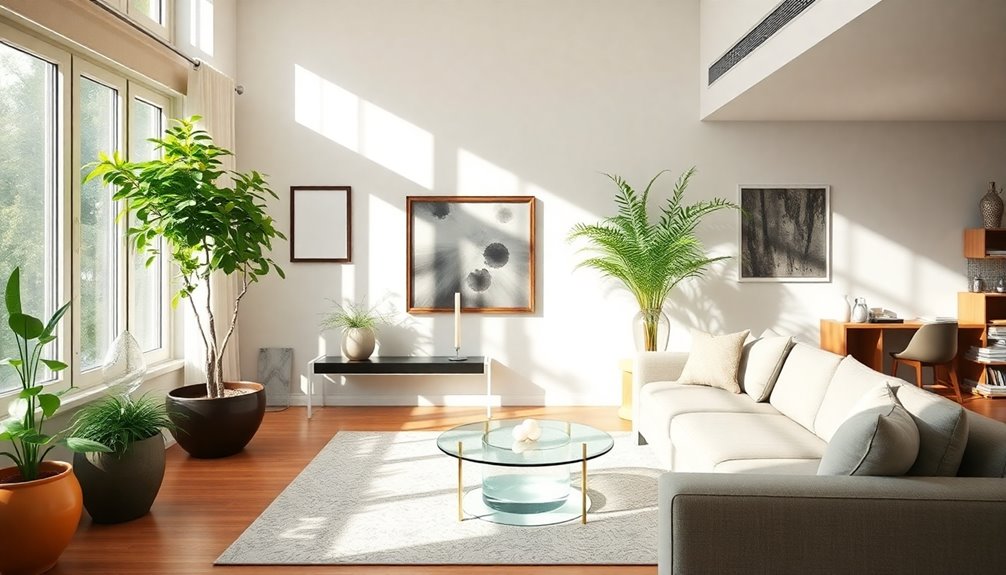Feng Shui plays a pivotal role in home design by fostering balance and positive energy flow. It’s not just about specific décor styles or superstition; instead, it’s about personalizing your space to reflect your needs. Clutter-free environments and mindful furniture arrangement enhance harmony and comfort. By understanding how energy flows and mapping it to your unique layout, you can create inviting spaces. Discover how to effectively implement these principles in your own home for greater well-being.
Key Takeaways
- Feng Shui is not mere superstition; it’s a practical approach to creating harmonious living spaces through energy flow and balance.
- Personalization is key; effective Feng Shui practices are tailored to individual needs rather than following a one-size-fits-all method.
- Clutter obstructs chi, emphasizing the need for organized spaces to allow positive energy to flow freely throughout the home.
- Natural elements and thoughtful furniture arrangements enhance energy flow, creating comfort and functionality in home design.
- Color choices and layout significantly influence emotions, promoting well-being and emotional balance in living environments.
Understanding Feng Shui: The Basics
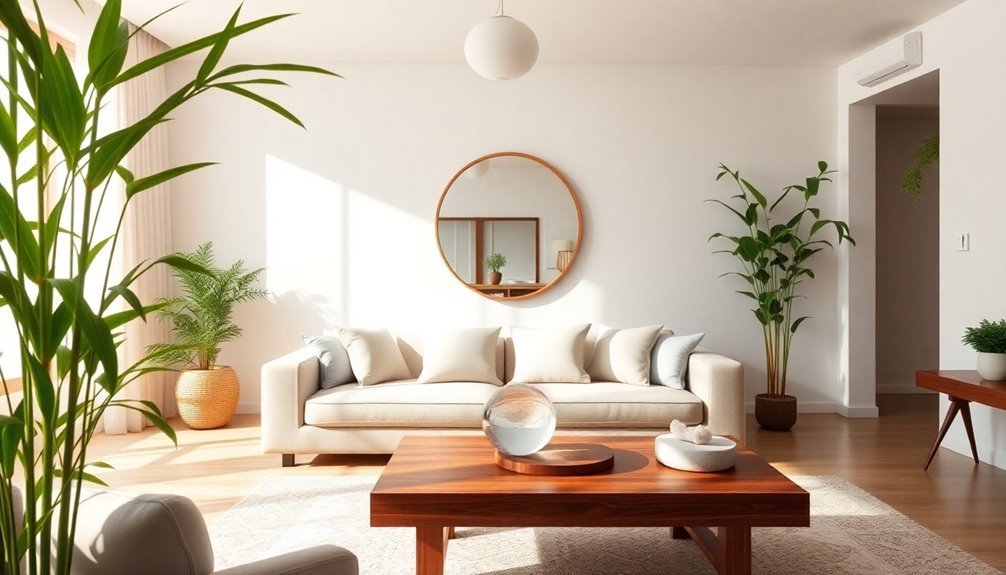
Understanding Feng Shui principles involves recognizing the importance of balance and harmony, which is achieved through the integration of five elements: wood, fire, earth, metal, and water. A common misconception is that Feng Shui only revolves around furniture placement; however, it extends to factors like natural light, airflow, and the property’s history. Additionally, keeping clutter-free spaces, especially in entryways, allows positive energy to enter your home. Personalization plays an essential role, as each space should reflect its unique characteristics and the goals of its occupants, ensuring a harmonious living environment. Incorporating natural elements into your decor can further enhance the flow of positive energy within your home.
Common Myths About Feng Shui

You might think Feng Shui is just a superstition or that it requires a specific décor style to be effective.
Many believe it offers one-size-fits-all solutions, but that’s far from the truth.
Let’s clear up these misconceptions and explore how Feng Shui can truly enhance your space. Additionally, understanding the importance of planning ahead can help create a more harmonious living environment that aligns with your long-term goals.
Feng Shui Is Superstition
Many dismiss Feng Shui as mere superstition, overlooking its foundation in the flow of energy, or qi, within our environments.
This ancient practice emphasizes how the arrangement of furniture and the presence of clutter can influence our emotional well-being. Instead of viewing it as a set of myths about Feng Shui, consider how an organized space promotes calmness and positive energy flow.
For example, a cluttered front door can block qi, affecting your mood as you enter your home. Additionally, maintaining a clean environment can reduce allergens and pollutants, further enhancing overall wellness and tranquility in your living space.
Requires Specific Décor Style
Contrary to popular belief, Feng Shui doesn’t require a specific décor style to be effective. Instead, it emphasizes balance and energy flow, allowing you to integrate its principles into any interior design. You can subtly incorporate Feng Shui elements without relying on traditional Feng Shui artifacts. Personalization is essential; it’s all about identifying elements that resonate with your taste and goals. In the same way that Waldorf toys prioritize emotional and social growth through play, your home can reflect your personal growth and well-being.
| Myth | Reality |
|---|---|
| Requires Chinese décor | Works with any style |
| Focuses on aesthetics | Prioritizes balance and energy flow |
| Limited to traditional items | Emphasizes personalization over tradition |
| One-size-fits-all | Tailored to individual preferences |
| Superstitious belief | A practical approach to harmonious living |
Embrace Feng Shui to create spaces that truly reflect you!
One-Size-Fits-All Solutions
While it might seem convenient to apply a one-size-fits-all approach to Feng Shui, doing so can overlook the unique qualities of your home.
Feng Shui is a complex system that considers factors like your home’s location, layout, and even its construction date. Relying on generic tips can oversimplify this practice and limit your ability to achieve good Feng Shui.
To truly benefit, you should work with a qualified Feng Shui consultant who can provide personalized insights and energy maps tailored to your specific needs. Incorporating natural materials into your home design can also enhance the overall energy flow and comfort of your space.
This collaboration guarantees that the adjustments made enhance your living environment, addressing your individual goals rather than applying standard guidelines that may not suit your unique space.
The Importance of Energy Flow in Design
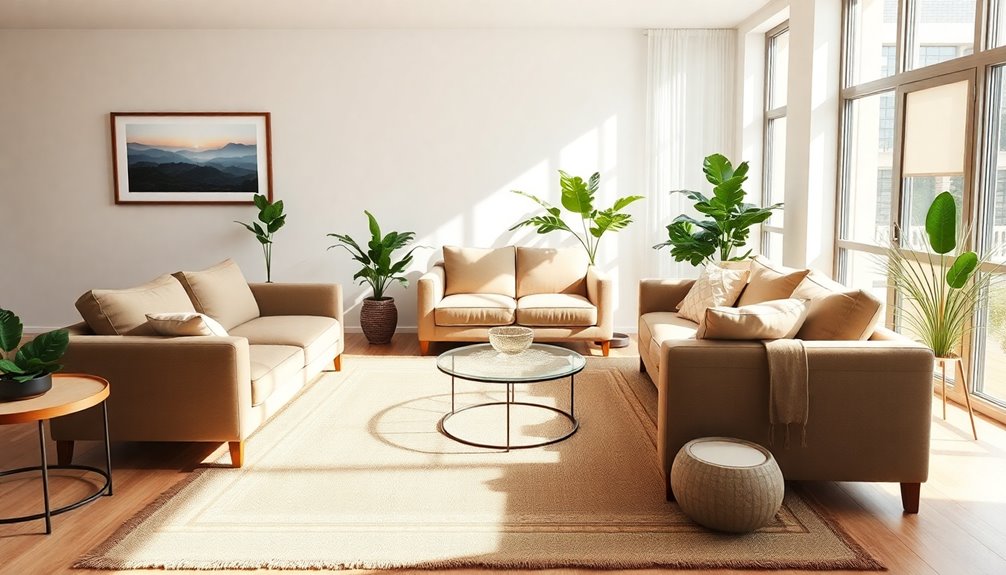
Understanding the importance of energy flow, or chi, in home design can transform your living space into a sanctuary of harmony and balance. A cluttered environment obstructs chi, while organized spaces promote positive energy. Arranging your furniture around to enhance energy flow is essential for comfort and functionality. Additionally, incorporating natural light and airflow keeps your space vibrant. Best Beach Towels of 2023 ensure that your beach experiences are relaxing and enjoyable, further enhancing your overall sense of well-being.
| Element | Role in Energy Flow | Tips for Incorporation |
|---|---|---|
| Wood | Growth and liveliness | Use wooden furniture |
| Fire | Passion and warmth | Add candles or warm colors |
| Earth | Stability and grounding | Use earthy tones and materials |
| Water | Flow and abundance | Incorporate water features |
Personalizing Feng Shui for Unique Spaces
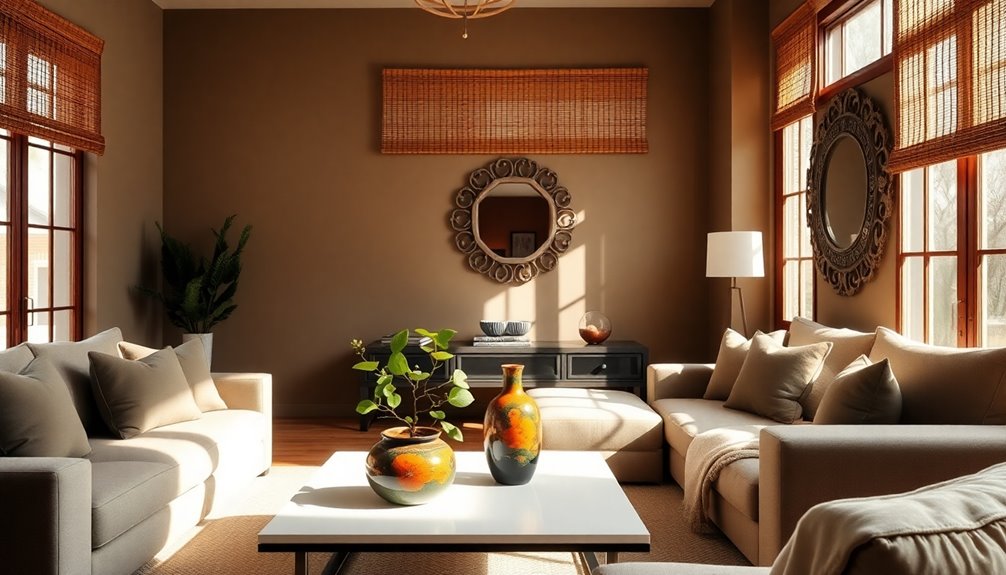
When personalizing Feng Shui for your unique space, start by mapping the energy flow specific to your home’s layout and surroundings.
Assess your individual needs and goals to guarantee that the design supports your lifestyle. Additionally, consider how the art of decluttering can enhance your environment by creating a more organized and harmonious space.
Tailored Energy Mapping
Tailored energy mapping transforms your living space into a sanctuary by customizing Feng Shui practices to fit your unique environment.
This approach involves creating a distinct energy map based on your home’s location, layout, construction date, and your specific goals. A good Feng Shui master will utilize methods like the Classical Flying Stars technique to identify strengths and weaknesses in your space.
This highly personalized method guarantees that energy adjustments resonate with your lifestyle, addressing your household’s unique characteristics. By collaborating with a qualified practitioner, you can uncover energy centers in your home, leading to enhancements that support well-being, relationships, and prosperity. Additionally, incorporating energy-saving features can enhance the overall comfort of your space while promoting a sustainable lifestyle.
Tailored energy mapping creates a harmonious environment that truly reflects you and your needs.
Individual Needs Assessment
An individual needs assessment is crucial for personalizing Feng Shui in your home, ensuring that the energy flow aligns with your unique lifestyle and aspirations.
A qualified Feng Shui master will evaluate your personal goals, lifestyle, and preferences, tailoring the energy in your space effectively. They’ll consider your home’s layout, location, and architectural style to create personalized solutions that resonate with you.
By identifying any missing elements in your environment, they can recommend specific enhancements that promote harmony and balance. This might involve adjusting furniture placement, selecting colors, or choosing decor that reflects your energy and intentions. Additionally, effective preparation and client engagement can enhance the consultation process, ensuring that all aspects of your design vision are considered.
Unique Element Integration
Integrating unique elements into your home design can transform your space into a harmonious sanctuary that truly reflects who you are. By incorporating Feng Shui principles, you can personalize your unique spaces with the five elements—wood, fire, earth, metal, and water. Assess your layout and orientation to enhance energy flow, and choose colors and textures that resonate with you. Additionally, consider using natural materials such as wood and stone to enhance the overall energy of your space.
Here’s a simple guide to help you integrate personal symbols:
| Element | Color | Personal Symbol |
|---|---|---|
| Wood | Green | Family photo |
| Fire | Red | Artwork from travels |
| Earth | Yellow | Pottery from ancestors |
| Metal | White | Heirloom jewelry |
| Water | Blue | Inspirational quotes |
These touches create a space that fosters connection and comfort.
Practical Applications in Home Design
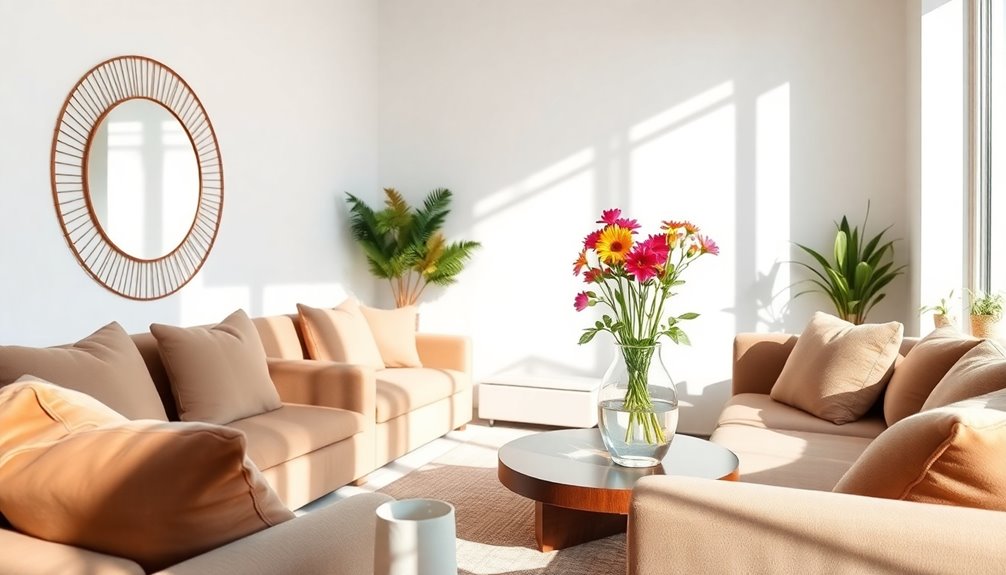
When you consider the principles of Feng Shui in your home design, you can create a more harmonious living environment that enhances your well-being.
Here are some practical applications to guide you:
- Position furniture to encourage positive energy flow (chi).
- Maximize natural light and airflow for improved mood.
- Choose colors wisely; they can influence emotions and social interactions.
- Keep bathroom doors closed to reduce negative energy.
- Regularly assess and adjust your design elements to align with changing circumstances.
Resources for Further Learning and Support
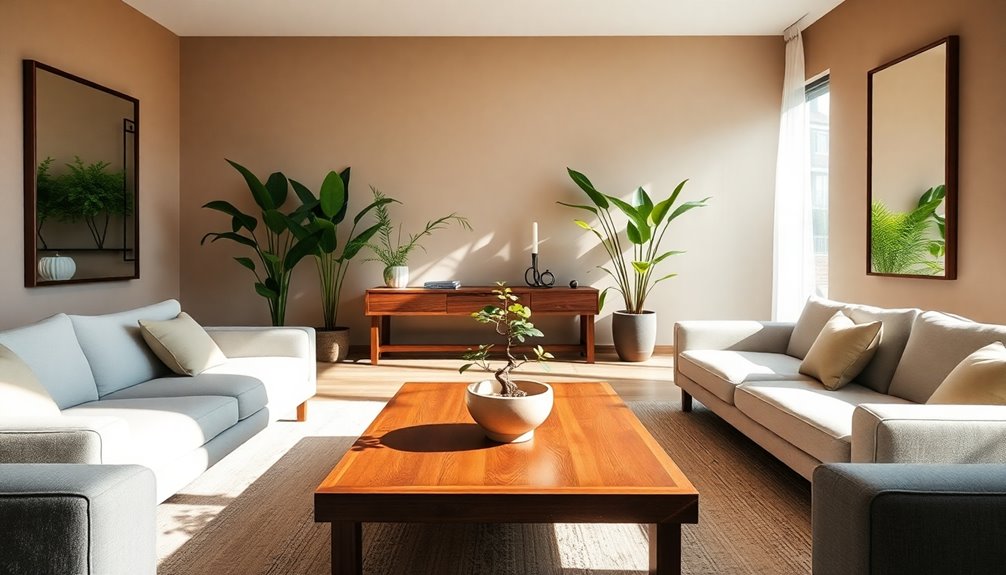
To truly harness the benefits of Feng Shui in your home design, exploring additional resources can provide valuable insights and support. Consider engaging with online courses, checklists, and social media communities to enhance your knowledge. Here’s a quick guide to get you started:
| Resource Type | Description | Where to Find |
|---|---|---|
| Free Mini Course | Learn common mistakes and best practices | Various online platforms |
| Ultimate Checklist | Essential steps for energy flow | fengshuiconcepts.com.au |
| Social Media Experts | Daily tips and inspiration | Follow experts on Instagram |
| Workshops/Courses | Deepen your understanding of Feng Shui | Local community centers or online |
| Articles & Blogs | Personalized Feng Shui applications | fengshuiconcepts.com.au |
Utilize these resources to improve your practice of Feng Shui!
Frequently Asked Questions
Is There Any Truth to Feng Shui?
Yes, there’s truth to Feng Shui.
It’s more than just arranging furniture; it’s about energy flow and how your space affects your well-being.
You’ll find that your personal experience plays a big role in its effectiveness.
By understanding the principles and adapting them to your lifestyle, you can create a more harmonious environment.
Just keep in mind that it’s an ongoing process, so be open to reassessing your space as your life changes.
Do Interior Designers Use Feng Shui?
Many interior designers use Feng Shui like a secret ingredient in a recipe, enhancing the harmony of spaces.
They consider factors like natural light, airflow, and furniture placement to create balanced environments that resonate with your needs.
While not every designer incorporates these principles, those who do often seek additional training to offer a more holistic approach.
This method not only improves aesthetics but also elevates your overall comfort and well-being in your home.
What Are the 5 Principles of Feng Shui?
The five principles of Feng Shui are essential for creating harmony in your space.
First, focus on energy flow (chi) to guarantee it moves freely.
Next, balance the five elements: wood, fire, earth, metal, and water.
Third, maintain a yin and yang balance for peace.
Fourth, use the bagua map to analyze different life areas.
Finally, manage clutter to keep energy positive and flowing smoothly throughout your home.
How Do I Know if My House Has Good Feng Shui?
To know if your house has good feng shui, start by evaluating how easily you can move through your spaces.
Look for clutter and obstacles that might block energy flow.
Check if your rooms receive ample natural light and airflow, as these contribute to a positive atmosphere.
Evaluate your furniture placement; verify key pieces are positioned for support.
Finally, keep your entryway clean and organized to invite good energy into your home.
Conclusion
Incorporating feng shui into your home design can truly transform your living space, creating a harmonious environment that enhances your well-being. While myths may cloud its principles, understanding the basics and focusing on energy flow can lead to meaningful improvements. Why not explore how personalized touches can elevate your unique space? With practical applications and resources at your fingertips, you’re well-equipped to embrace feng shui and enjoy a balanced, inviting home.
